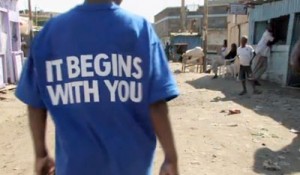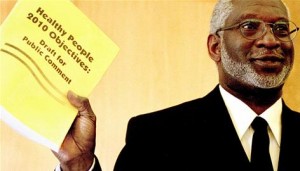Caring and Compassion Globally
Thoughts from David Satcher, MD, PhD
 I’ve been the beneficiary of caring and compassion beginning very early in my life and throughout my life. I try to carry that out for other people, and the interests of others have always challenged. I’m always asking myself, can I do better? Can I do more? Can I respond better to the needs of people in the local communities that we work with here in Atlanta or globally? How do I impact the global challenge of the poor and the under served?
I’ve been the beneficiary of caring and compassion beginning very early in my life and throughout my life. I try to carry that out for other people, and the interests of others have always challenged. I’m always asking myself, can I do better? Can I do more? Can I respond better to the needs of people in the local communities that we work with here in Atlanta or globally? How do I impact the global challenge of the poor and the under served?
What is it that drives some people to compassionate lives? That is not an easy answer for me. My parents had ten children and never made more than ten thousand dollars a year, however their focus was always on “what can we do for other people?” If we had a good year with crops, we carried vegetables to other people in the community, along with eggs and milk. For my parents, compassion was their religion, and a part of their religious belief. It had to do with responsibility, not just to love other people, but to act that way. I grew up in this environment, in a home where neither of my parents finished elementary school, but they impressed upon us the importance of really caring about and caring for other people.
I first saw compassion demonstrated at home on a farm outside of Anniston, Alabama. I became sick as a child with whooping cough and then pneumonia. There was no hospital that would take black children in Alabama at that time. However, there was one doctor, Dr. Jackson, who my father was able to get to come out to the farm. He came on his off day, apparently, and spent the whole day with me even though he didn’t think I was going to survive. He took the time to entrust my parents as to what they could do to give me the best chance of survival, and they must have done a great job because I did survive.
I think my mother told me that story almost every day, so by the time I was five years old the one thing I wanted to do was to meet Dr. Jackson. My parents promised me that for my sixth birthday they were going to take me to meet Dr. Jackson, and I was really excited about that. I never met him. He died that year of a stroke. He was fifty-four years old, but by the time I was six I was telling everybody that I wanted to be a doctor like Dr. Jackson. What was in my mind was what he did for me. I think I have been driven by that image throughout my career. I’ve had the opportunity to do a lot of work in Africa and India and many other countries throughout the world. I have been very moved by witnessing people working to help other globally, especially in some of the most under served and poverty stricken environments.
I feel very deeply  that we all have a major responsibility to respond to the needs of people who are often left out. Even in our very sophisticated health system, in this country, it’s amazing how many people get left out. We have a major responsibility, each one of us, to use our influence, to use out abilities, to really make a difference for people who tend to be forgotten.
that we all have a major responsibility to respond to the needs of people who are often left out. Even in our very sophisticated health system, in this country, it’s amazing how many people get left out. We have a major responsibility, each one of us, to use our influence, to use out abilities, to really make a difference for people who tend to be forgotten.
I think global health has changed. Some of that’s technology and communication. We live in a world today where people are immediately in contact with other people globally. That was not true twenty-five or thirty years ago. We are developing new technologies, new strategies, that are going to have a major impact on things like safe water and good nutrition for all people. We are putting in place systems that can make us much more efficient. And at the base, hopefully, of those systems is a caring and compassion that will reflect itself in terms of the outcomes for these people.
Individuals with unusual passion and commitment can make a difference in this world. We’ve seen it over and over again as we’ve carried out public health initiatives globally. We find people working in areas where they may be only impacting a small number of people, but ultimately they influence what we all do in these areas. It is important that our students, our fellows and others, understand the difference that individuals have made and can still make in the world in carrying out their passion and their commitment. Our young people need to hear the stories. They need to hear the stories of people who had commitment—Bill Foege and others who led to the eradication of smallpox, who worked in environments that were very difficult. They certainly didn’t have the kind of technology that we take for granted today, and yet that passion led to major change in the world. It also influenced a lot of other people, and some of those people are on the forefront today of programs that are much more technologically sophisticated and will make dramatic differences in the world.
Appointed by President Bill Clinton in 1998 as the 16th Surgeon General of the United States, Dr. Satcher served simultaneously in the positions of Surgeon General and Assistant Secretary of Health at the U.S. Department of Health and Human Services. As such, he held the rare rank of full Admiral in the U.S. Public Health Corps, to reflect his dual offices.
